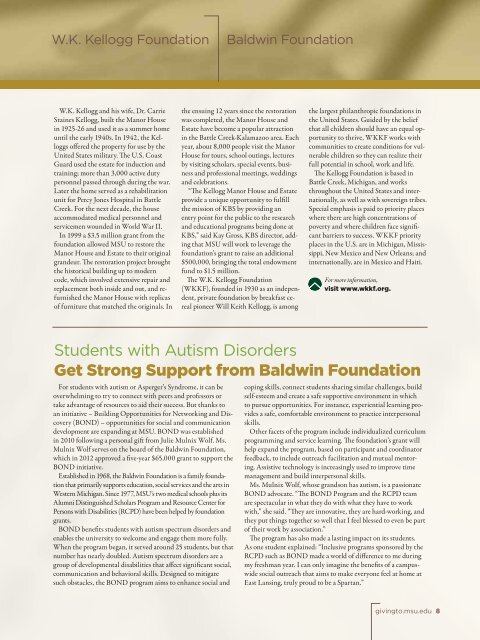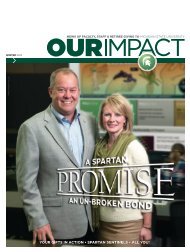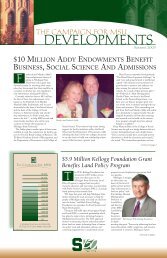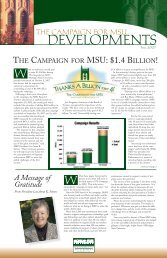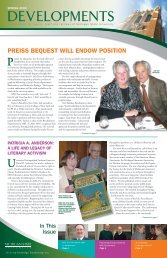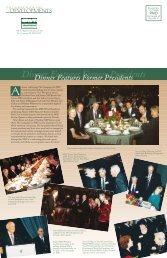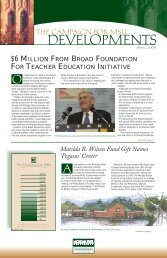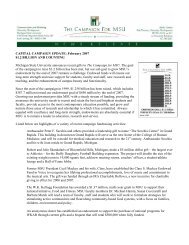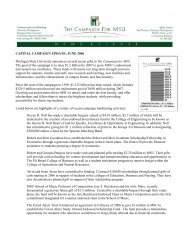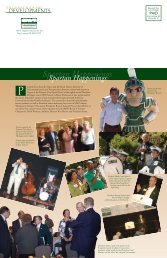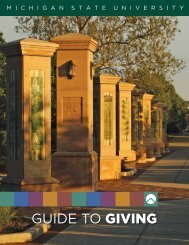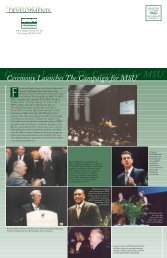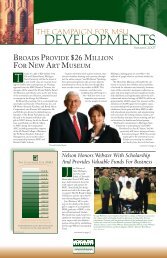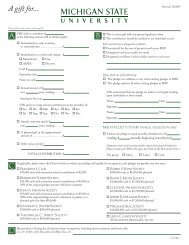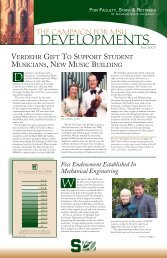Winter 2013 - Giving to MSU - Michigan State University
Winter 2013 - Giving to MSU - Michigan State University
Winter 2013 - Giving to MSU - Michigan State University
Create successful ePaper yourself
Turn your PDF publications into a flip-book with our unique Google optimized e-Paper software.
W.K. Kellogg Foundation<br />
Baldwin Foundation<br />
W.K. Kellogg and his wife, Dr. Carrie<br />
Staines Kellogg, built the Manor House<br />
in 1925-26 and used it as a summer home<br />
until the early 1940s. In 1942, the Kelloggs<br />
offered the property for use by the<br />
United <strong>State</strong>s military. The U.S. Coast<br />
Guard used the estate for induction and<br />
training; more than 3,000 active duty<br />
personnel passed through during the war.<br />
Later the home served as a rehabilitation<br />
unit for Percy Jones Hospital in Battle<br />
Creek. For the next decade, the house<br />
accommodated medical personnel and<br />
servicemen wounded in World War II.<br />
In 1999 a $3.5 million grant from the<br />
foundation allowed <strong>MSU</strong> <strong>to</strong> res<strong>to</strong>re the<br />
Manor House and Estate <strong>to</strong> their original<br />
grandeur. The res<strong>to</strong>ration project brought<br />
the his<strong>to</strong>rical building up <strong>to</strong> modern<br />
code, which involved extensive repair and<br />
replacement both inside and out, and refurnished<br />
the Manor House with replicas<br />
of furniture that matched the originals. In<br />
the ensuing 12 years since the res<strong>to</strong>ration<br />
was completed, the Manor House and<br />
Estate have become a popular attraction<br />
in the Battle Creek-Kalamazoo area. Each<br />
year, about 8,000 people visit the Manor<br />
House for <strong>to</strong>urs, school outings, lectures<br />
by visiting scholars, special events, business<br />
and professional meetings, weddings<br />
and celebrations.<br />
“The Kellogg Manor House and Estate<br />
provide a unique opportunity <strong>to</strong> fulfill<br />
the mission of KBS by providing an<br />
entry point for the public <strong>to</strong> the research<br />
and educational programs being done at<br />
KBS,” said Kay Gross, KBS direc<strong>to</strong>r, adding<br />
that <strong>MSU</strong> will work <strong>to</strong> leverage the<br />
foundation’s grant <strong>to</strong> raise an additional<br />
$500,000, bringing the <strong>to</strong>tal endowment<br />
fund <strong>to</strong> $1.5 million.<br />
The W.K. Kellogg Foundation<br />
(WKKF), founded in 1930 as an independent,<br />
private foundation by breakfast cereal<br />
pioneer Will Keith Kellogg, is among<br />
the largest philanthropic foundations in<br />
the United <strong>State</strong>s. Guided by the belief<br />
that all children should have an equal opportunity<br />
<strong>to</strong> thrive, WKKF works with<br />
communities <strong>to</strong> create conditions for vulnerable<br />
children so they can realize their<br />
full potential in school, work and life.<br />
The Kellogg Foundation is based in<br />
Battle Creek, <strong>Michigan</strong>, and works<br />
throughout the United <strong>State</strong>s and internationally,<br />
as well as with sovereign tribes.<br />
Special emphasis is paid <strong>to</strong> priority places<br />
where there are high concentrations of<br />
poverty and where children face significant<br />
barriers <strong>to</strong> success. WKKF priority<br />
places in the U.S. are in <strong>Michigan</strong>, Mississippi,<br />
New Mexico and New Orleans; and<br />
internationally, are in Mexico and Haiti.<br />
For more information,<br />
visit www.wkkf.org.<br />
Students with Autism Disorders<br />
Get Strong Support from Baldwin Foundation<br />
For students with autism or Asperger’s Syndrome, it can be<br />
overwhelming <strong>to</strong> try <strong>to</strong> connect with peers and professors or<br />
take advantage of resources <strong>to</strong> aid their success. But thanks <strong>to</strong><br />
an initiative – Building Opportunities for Networking and Discovery<br />
(BOND) – opportunities for social and communication<br />
development are expanding at <strong>MSU</strong>. BOND was established<br />
in 2010 following a personal gift from Julie Mulnix Wolf. Ms.<br />
Mulnix Wolf serves on the board of the Baldwin Foundation,<br />
which in 2012 approved a five-year $65,000 grant <strong>to</strong> support the<br />
BOND initiative.<br />
Established in 1968, the Baldwin Foundation is a family foundation<br />
that primarily supports education, social services and the arts in<br />
Western <strong>Michigan</strong>. Since 1977, <strong>MSU</strong>’s two medical schools plus its<br />
Alumni Distinguished Scholars Program and Resource Center for<br />
Persons with Disabilities (RCPD) have been helped by foundation<br />
grants.<br />
BOND benefits students with autism spectrum disorders and<br />
enables the university <strong>to</strong> welcome and engage them more fully.<br />
When the program began, it served around 25 students, but that<br />
number has nearly doubled. Autism spectrum disorders are a<br />
group of developmental disabilities that affect significant social,<br />
communication and behavioral skills. Designed <strong>to</strong> mitigate<br />
such obstacles, the BOND program aims <strong>to</strong> enhance social and<br />
coping skills, connect students sharing similar challenges, build<br />
self-esteem and create a safe supportive environment in which<br />
<strong>to</strong> pursue opportunities. For instance, experiential learning provides<br />
a safe, comfortable environment <strong>to</strong> practice interpersonal<br />
skills.<br />
Other facets of the program include individualized curriculum<br />
programming and service learning. The foundation’s grant will<br />
help expand the program, based on participant and coordina<strong>to</strong>r<br />
feedback, <strong>to</strong> include outreach facilitation and mutual men<strong>to</strong>ring.<br />
Assistive technology is increasingly used <strong>to</strong> improve time<br />
management and build interpersonal skills.<br />
Ms. Mulnix Wolf, whose grandson has autism, is a passionate<br />
BOND advocate. “The BOND Program and the RCPD team<br />
are spectacular in what they do with what they have <strong>to</strong> work<br />
with,” she said. “They are innovative, they are hard-working, and<br />
they put things <strong>to</strong>gether so well that I feel blessed <strong>to</strong> even be part<br />
of their work by association.”<br />
The program has also made a lasting impact on its students.<br />
As one student explained: “Inclusive programs sponsored by the<br />
RCPD such as BOND made a world of difference <strong>to</strong> me during<br />
my freshman year. I can only imagine the benefits of a campuswide<br />
social outreach that aims <strong>to</strong> make everyone feel at home at<br />
East Lansing, truly proud <strong>to</strong> be a Spartan.”<br />
giving<strong>to</strong>.msu.edu 8


